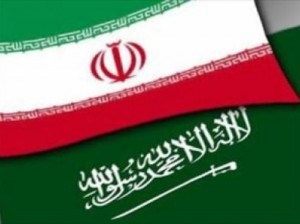 Are regional rivals Iran and Saudi Arabia heading for a rapprochement? Is there an Indian hand in this? Talk on the possible development in the Gulf swirled in the diplomatic and strategic circles as India played host to Crown Prince Salman bin Abdulaziz of Saudi Arabia and Iran's Foreign Minister Mohammad Javad Zarif during the same week last month.
Are regional rivals Iran and Saudi Arabia heading for a rapprochement? Is there an Indian hand in this? Talk on the possible development in the Gulf swirled in the diplomatic and strategic circles as India played host to Crown Prince Salman bin Abdulaziz of Saudi Arabia and Iran's Foreign Minister Mohammad Javad Zarif during the same week last month.What has further fuelled�the talk is Iranian president Hassan Rohani's statement earlier this week.
"Expansion of relations with neighbouring Muslim countries, particularly Saudi Arabia, is a priority in Iran's foreign policy," Rohani said, accepting credentials of the new Saudi ambassador to Tehran. Rohani also referred to the potential of Tehran and Riyadh cooperating and said that development of ties between the two states can boost regional stability and security.
"Boosting relations between Saudi Arabia and Iran can help halt unrests in some regional countries and prevent spread of sectarian violence in the region," the Iranian foreign ministry quoted him as saying, to which the Saudi envoy Abdolrahma Bin Gharman al-Shahri responded positively, saying Riyadh is ready for expansion of ties with Tehran.
If the new warmth is for real, the political communication between Sunni-majority Saudi Arabia and Shia-dominated Iran can positively affect the entire region, benefiting India's own national security. For decades, both have been jostling for influence over countries in the region that have significant Shia and Sunni populations. Their strategic rivalry and sectarian tension have been destabilising for the Gulf, and deleterious for India's economic and security interests.
For example, in the ongoing civil war in Syria, Iran is backing the regime of President Bashar al-Assad while Saudi Arabia was supporting the opposition. Both can influence political developments in Pakistan and Afghanistan in the coming years.
India thus has significant strategic interest in encouraging reconciliation between the two that could open up extraordinary opportunities for the country in a region which provides nearly 60 percent of its energy needs. Home to seven million expatriate Indians who send back $30 billion home annually, the Gulf countries are India's largest trading partner as a regional grouping with an annual trade of over $180 billion, which is almost 26 percent of the nation's global trade. The region has been also a factor in food security as a major source of phosphatic and other fertiliser. Major maritime lines of communication carrying India's Westward trade and energy supplies pass through the region.
The visits of the two leaders took place amidst interesting geopolitical changes in the region -- the difference between allies US and Saudi Arabia over the civil war in Syria, and the reconciliation between Iran and the US over Tehran's nuclear programme, in which, reports indicated, India might have played a part.
Both Riyadh and Tehran look to India to improve their regional and international profile. India's relations with Saudi Arabia have seen significant expansion since the visit of King Abdullah in 2006 and Prime Minister Manmohan Singh's return visit in 2010 during which the seminal Delhi Declaration and the Riyadh Declaration were signed. Cooperation in defence and counter-terrorism has picked up. The two countries signed an extradition pact in 2010. In 2012, Saudi Arabia facilitated the arrest and repatriation to India of three terror suspects, including Abu Jundal, regarded as one of the masterminds of the 2008 terror attacks. In recent years, Riyadh has indicated neutrality in India's disputes with Pakistan.
With Iran, relations are set to see substantial improvement with the lifting of sanctions on the country. Zarif, referring to his talks with the Indian vice-president, prime minister, foreign minister and national security advisors, said that important mutual interests and regional issues such as the situation in Afghanistan, Syria and the fight against extremism were discussed.
India's interest lies in a peaceful and balanced strategic environment in West Asia, which is such an important part of the country's extended periphery. In fact, there is today no other region which impinges on its security with as much immediacy as West Asia. The dramatic developments in the region over the past couple of years have forced India to engage with the region more than ever before.
"We are part of the region, we are not from far away. We will work with our partners across the region," National Security Advisor Shiv Shankar Menon said, addressing the Asian Security Conference in February. India is doing that by intensifying the communication with the Saudi and Iranian leadership.
This article was written by�Saroj Mohanty for the opinion page of News Track India on March 6,2014.Saroj Mohanty�is a writer on international and strategic affairs at IANS. The views expressed are personal.
The Iran Project is not responsible for the content of quoted articles.










